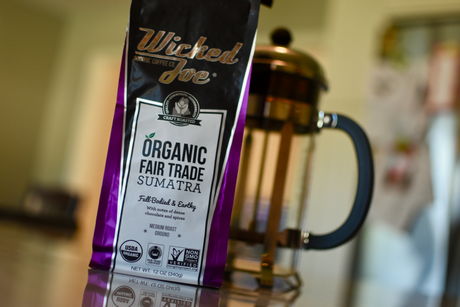What you see in the above video is how I get my coffee fix on Saturday and Sunday mornings. It involves a very reasonably priced coffee and a very resonably priced (and durable!) Italian espresso pot. I don't need a fancy coffee machine that takes up valuable counter space in my kitchen or some super exotic coffee blend to get me through the weekend grind (see what I did there?). What you see up above works just fine. That being said, I'm not opposed to trying something different (and a little more expensive) every once in a while. Especially when someone else is buying...
Back in mid-August, we were approached by Christie & Co, a Santa Barbara, California based public relations firm, asking if we'd like to review some of the Great State of Maine's Wicked Joe Organic Coffee. Since we (and by we, I mean me) most definitely love a delicious cup of freshly brewed java (you can keep your Chesterfield Kings) at this here blog, as you are well aware, the majority of our time is spent writing about the not-so-soft side of the beverage world (i.e. beverages that contain alcohol). While beer, whisky and other boozy drinks are our focus, we have explored a few soft drinks recently, so agreeing to review some coffee made perfect sense.
Although the coffee that we received was roasted in Topsham, Maine, the beans were most definitely not grown there. If you want lobster and wild blueberries, Maine is definitely where you want to be, but to get high quality coffee beans, you'll need to head South. To be more specific, you'll need to travel a good bit closer to the Equator, because according to the National Coffee Association, "the ideal conditions for coffee trees to thrive are found around the world, along the Equatorial zone called "The Bean Belt," located between latitudes 25 degrees North and 30 degrees South". The beans that were used to make the coffee we received were grown in Sumatra...

Now that you know a bit about Wicked Joe Organic Coffee and where they sourced the coffee that they sent us, here's how I brewed a cup of their Sumatra coffee on a lazy Sunday morning using a French Press ...
And now for my review...
- Appearance: Not as dark as I was expecting. Medium brown color with an even lighter brown hue around the edges.
- Aroma: Also not as strong smelling as I was expecting. Smells like a lightly scented coffee with some milk chocolate, cardamon, and a hint of cinnamon coming through.
- Taste: Definitely a lighter cup of coffee than what I'm used to drinking (I'm an espresso and French roast coffee kind of guy). No bitterness at all. Just a smooth, easy drinking cup of coffee.
The Verdict
While there's no doubt that this was a quality cup o' Wicked Joe, it lacks the punch of an espresso or French Roast coffee, which is what I usually drink (particularly on the weekends). Wicked Joe's Sumatra isn't what I'd call an "eye opening, just rolled out of bed" kind of coffee. Thanks to it's super smooth, easy drinking nature, this is the type of coffee that I'd have after dinner along with my dessert, since its more of a "relaxing after a big meal" kind of coffee.
________________________________________________
Many thanks to Lyndsay Flartey of Christie & Co for sending us this very generous sample!
Categories: Coffee, Wicked Joe Organic Coffee
Tagged as: Beverages, Coffee, Drinks, Drinkwire, French Press, Javatography, Organic Fair Trade Coffee, Review, Reviews, Videos, Wicked Joe Organic Coffee, Wicked Joe Sumatra Coffee, YouTube

